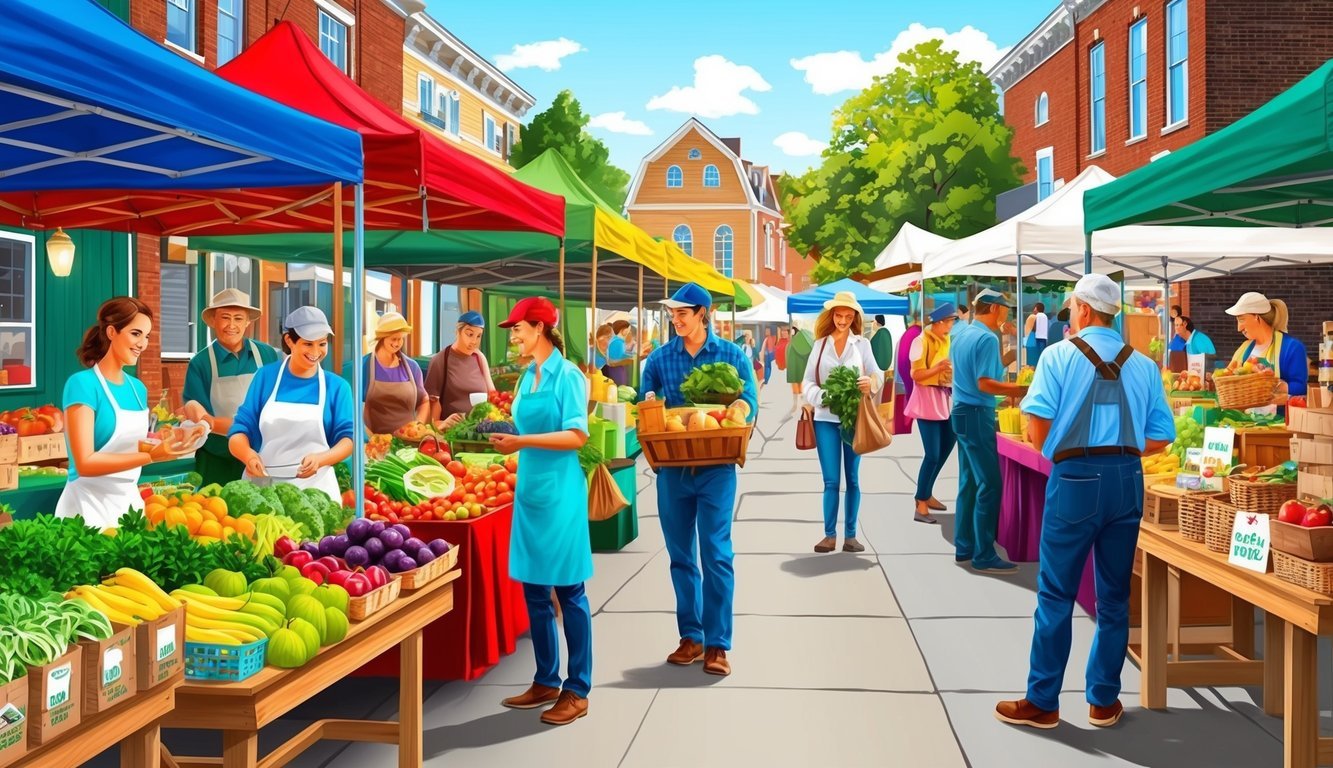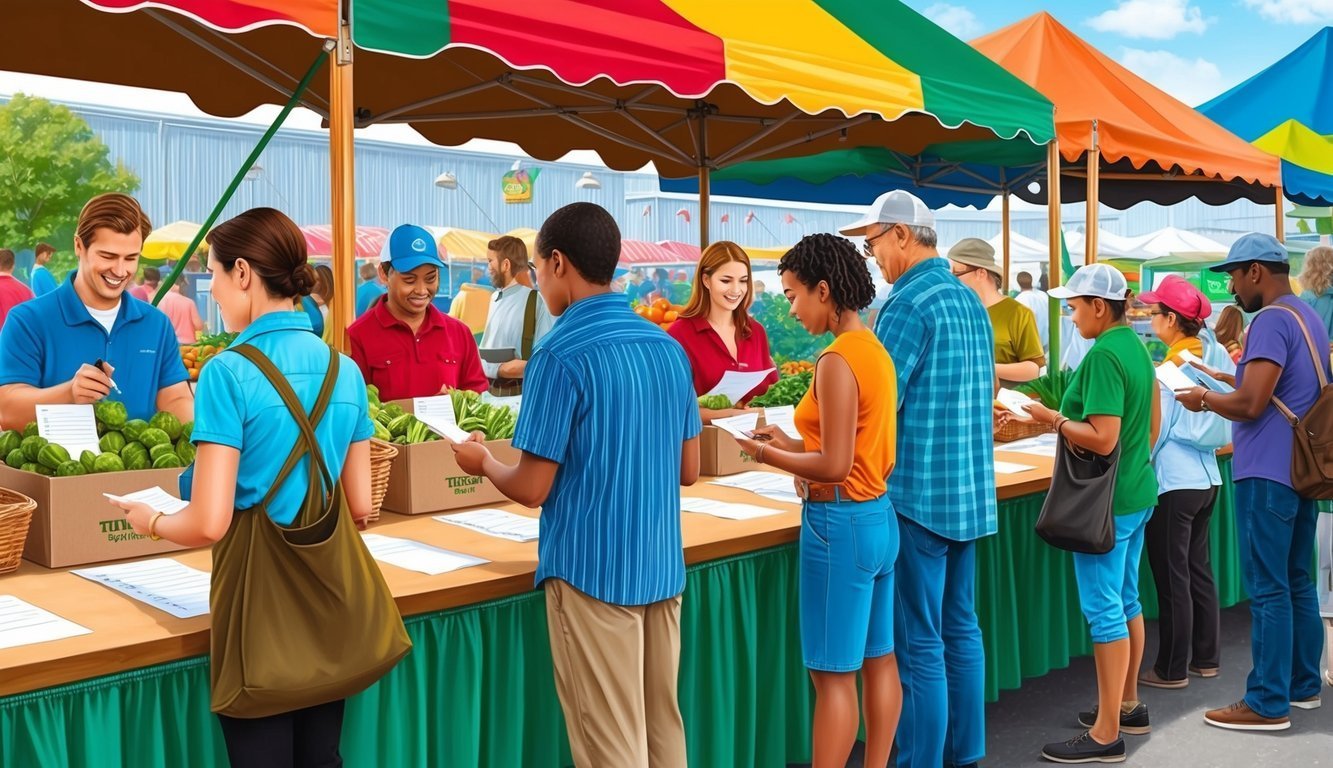Farmers markets are awesome! They’re a fantastic way to connect with your community and sell all those amazing local goodies.
If you’ve ever thought about becoming a vendor, you’re in for quite the adventure!
First things first, start by hunting down local markets in your area.
Once you’ve got a list, don’t be shy—reach out to the market managers and get the lowdown on their application process.
alt=”A buzzing farmers market with people filling out forms and chatting with a vendor under a colorful tent.
The atmosphere is lively and inviting.”>
Getting started as a vendor takes a bit of planning.
You’ll want to get your booth setup sorted and decide what delightful products you’ll be offering.
Heads up—many markets have specific rules and regulations, so give them a good read before diving into the application.
If you’re accepted (fingers crossed!), focus on creating a display that pops to attract customers.
Think vertical displays to showcase your products and keep your tables looking full.
Remember, your booth’s your storefront—it should feel welcoming and easy to navigate.
Key Takeaways
- Research local markets and reach out to managers for application details.
- Your booth setup and product selection matter in prepping for market day.
- A captivating display is crucial for drawing in customers and boosting sales.
Getting Started as a Vendor
Jumping into the farmers market scene? It’s all about a bit of planning and prep work.
Start by filling out that application and making sure you understand all the market’s rules.
Understanding the Application Process
To become a vendor at a farmers market, your first step is to grab an application form.
Each market will have its own version, so don’t skip that step!
These forms usually ask about your products and business, so be ready to highlight what makes your items stand out.
Some markets might even want to check out your farm or see proof of insurance, while others could just need a quick email explaining what you sell.
It’s wise to apply early—popular markets fill up faster than you think! You’ll often have the choice of becoming a day vendor, where you pay per market day, or an annual vendor, which means you pay upfront for the whole season and get a regular spot.
Meeting Market Requirements
Most markets have rules in place to keep things safe and fair.
Make sure you’re up-to-date with these regulations.
Commonly, markets will ask for permits and licenses, like a business license or a food handler’s card if you’re offering food.
If you’re selling food items, be prepared to have your products prepared in a commercial kitchen.
Home kitchens often don’t cut it when it comes to health codes.
Don’t forget proper labeling for packaged foods—list your ingredients and any allergens clearly.
Some markets participate in programs like WIC, so if you want to accept benefits, know that extra paperwork is involved.
Bring the right equipment—think tent, tables, and signs.
An inviting display can really pull customers in!
Boosting Your Market Presence

If you want to stand out at a farmers market, you’ve got to put in some effort.
Here are some fun strategies to increase your visibility and grow your business.
Marketing and Growth Strategies
To grab shoppers’ attention, having good marketing is essential.
Eye-catching signs and displays can do wonders.
Free samples of your veggies or herbs can also entice folks to try your delicious offerings!
Don’t underestimate the power of social media.
Show off your fresh produce on Instagram or share recipes using your products on Facebook.
Keeping an email list is a great way to keep customers in the loop about what’s new in your stall.
Teaming up with other vendors is a smart move too.
For example, a veggie farmer could collaborate with someone selling homemade pasta sauce to create a delicious meal idea.
Diversifying Your Offerings
Add some spice to your offerings to keep things exciting for your regulars.
If you’re a farmer who’s usually selling veggies, why not try offering some jams or pickles? Bakers might consider testing out gluten-free treats.
Specialty foods usually have higher profit margins.
Think about whipping up fancy cheeses or selling rare heirloom tomatoes—those unique items can attract curious shoppers.
Seasonal offerings are also a surefire way to keep customers coming back for more.
Pumpkins in the fall, strawberries in the spring.
Mixing things up keeps your stall fresh!
Hosting classes or demos is another crowd-pleaser.
Imagine a herb grower showing folks how to whip up pesto! This not only adds value but also helps build a rapport with customers.
Frequently Asked Questions
Signing up as a vendor at a farmers market involves understanding vendor requirements, costs, permits, and local regulations.
Some markets allow online applications while others may require you to register in person.
Doing your homework on each market’s specific rules and deadlines will make the application process smoother.
Many markets send out newsletters with vendor opportunities, so learning how to sign up for email alerts can keep you in the know.
And if you have questions about permits or booth setup, reach out to market organizers—they’re usually more than happy to help!
How do I become a vendor at a local farmers market?
To get started, contact the market manager or check out the market’s website.
Fill out an application form that includes details about what you’ll be selling.
Most markets prefer producer-only vendors who grow or craft their own items.
Attending a vendor meeting can help you learn about the rules and expectations.
Be aware that some popular product categories might have waiting lists.
What are the costs involved in starting up a booth at a farmers market?
Costs can vary by market, but they typically include booth fees and membership dues.
Booth fees may be charged daily, weekly, or seasonally.
Don’t forget to budget for supplies like tables, tents, and signage!
You’ll want to account for transportation costs and any equipment needed to display or store your products.
And heads up—some markets require vendors to carry liability insurance.
What permits are required to sell goods at a farmers market?
The permits you’ll need depend on your location and what you’re selling.
Common permits include a business license, sales tax permit, and possibly a food handler’s certificate for any prepared foods.
It’s a good idea to check with your local health department and the market manager for specific requirements.
Some areas have special permits for selling eggs, meat, or dairy products, so do your research!
Can you sign up for a farmers market booth online, and if so, how?
Many farmers markets now offer online applications.
Just pop over to the market’s website and look for a section dedicated to vendors or applications.
Fill out the online form with your contact info and product details.
You might need to upload photos or documents.
Some markets even use services like Farmers Market Network to manage vendors.
What steps should I take to set up a farmers market in my community?
Start by gathering a group of like-minded farmers and community members.
Conduct a feasibility survey to gauge interest and find potential locations.
After that, create a market plan along with some rules.
Secure a suitable location and obtain any necessary permits from local authorities.
Then, recruit vendors and promote the market within your community.
Are there specific regulations for selling food at a farmers market in Virginia?
Virginia has its own set of rules for food safety and labeling at farmers markets.
Vendors selling prepared foods will need a food establishment permit from the health department.
Some foods like baked goods, jams, and pickles may be allowed to be produced in home kitchens, but raw agricultural products generally don’t require special permits.
Be aware that meat and dairy have extra regulations to follow.

